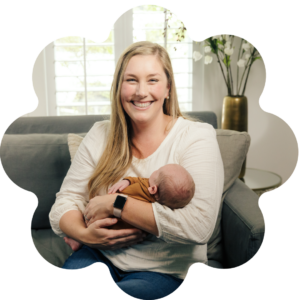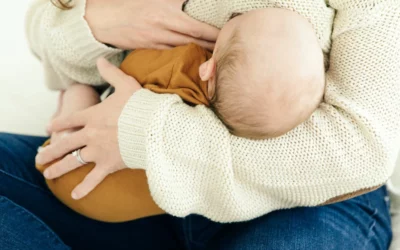If you are a mama, chances are you have heard about co-sleeping. I was scared to death to co-sleep with my first baby! I thought that anyone who co-slept was irresponsible and how could they take such a risk with their baby? Fast forward to baby number four, Clay, and I made the decision that I was going to co-sleep… However, there are co-sleeping pros and cons parents need to know.
Co-sleeping was not something that I did on a regular basis. For example, I kept Clay in bed with me after his early morning feed. I would also do sideline nursing; this is when I’d lay him on this side to feed. Co-sleeping is not how he would usually fall asleep.
Yes, co-sleeping can make breastfeeding easier. But, the American Academy of Pediatrics, “…recommends a safe sleep environment to reduce the risk of all sleep-related deaths. This includes supine positioning; use of a firm, noninclined sleep surface; room sharing without bed sharing; and avoidance of soft bedding and overheating.”
Of course, I took all the precautions that I could when I co-slept with Clay. This included An Owlet sock on his foot (get $25 off your first purchase when you sign up with email!), he was not swaddled, blankets were down, and there were no pillows around him. I just felt like we needed to do these small pockets of co-sleeping because I have three other kids and I really had to get a little bit of extra sleep.
If you want to co-sleep, there are ways that you can make it safer. I definitely recommend that you seek out resources and set yourself up to co-sleep in the safest way possible.
However, there are a few reasons why I still do not recommend co-sleeping that go beyond safety:
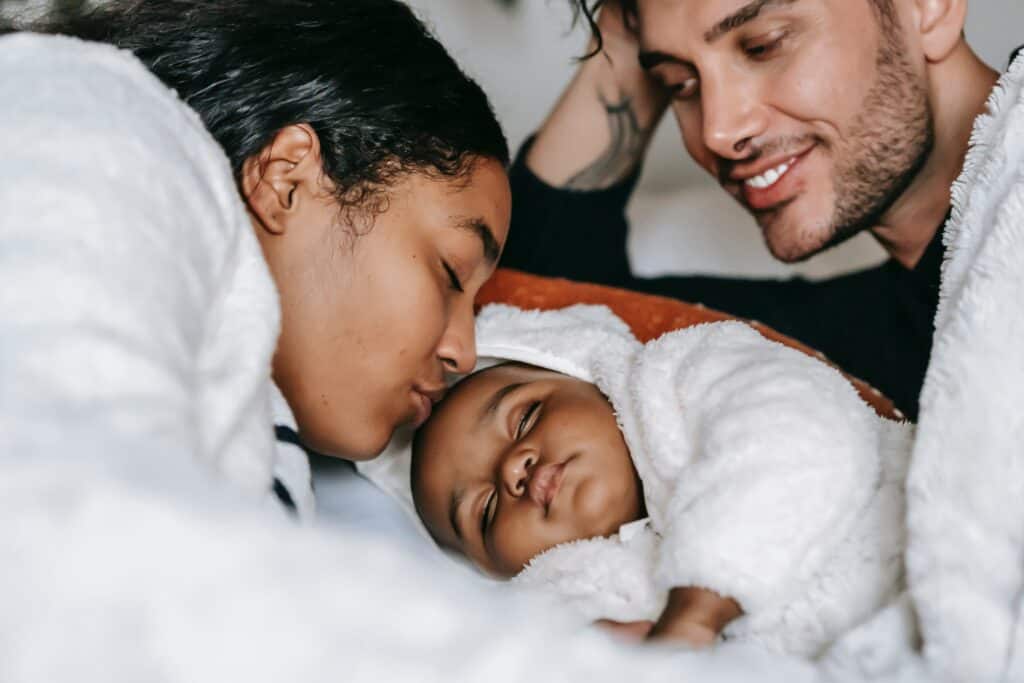
Quality Sleep
I do not support co-sleeping in the broad sense because it does not set your baby up for successful sleep in the long run. We want to make sure that they are getting good quality sleep!
I have worked with many parents to help take their babies from co-sleeping to sleeping independently. The parents report that their little ones are practically different babies when they are getting good quality sleep in their own safe sleep space. They are less fussy, more content, and happier.
Part of creating a safe crib or bassinet for your little one is removing all pillows and blankets to reduce the chance of SIDS (Sudden Infant Death Syndrome). I recommend sleep bags (this is what I use for Clay) to promote quality sleep for babies. Sleep bags help keep little ones warm while also still giving them the space to kick their legs.
Co-Sleeping Effects On Relationships
Co-sleeping may affect parenting multiple children. Let’s say this is your second or third child. It is really, really hard to be your baby’s anchor for sleep when you have other children in the house.
If you have a baby that is completely dependent on you for naps and nighttime sleep, it is going to be difficult for you to spend uninterrupted quality time with your other children. There is a connection between bringing a newborn home and how you mother your other children; they might experience a regression. Parents explains, “Regression can be a big sign of jealousy for toddlers. Kids may want to nurse again if they’ve been weaned or drink from a bottle when they’ve been happily using a sippy cup for months. Bedtime rituals may drag out and collide tragically with your baby’s fussy period. Also, a child who has been sleeping in their own bed may suddenly want to sleep in yours, particularly if the baby is in your room.”
Being your baby’s anchor for sleep while having other children in the household can be quite challenging. This situation has the potential to significantly impact your family life. It will likely make it more difficult for you to manage the care of your other children. This is especially true considering that a newborn typically requires around 16 to 20 hours of sleep within a 24-hour period, which gradually decreases to about 15 to 17 hours as they grow. Even as they reach six to 12 months of age, they still need approximately 14 to 16 hours of sleep per day.
Tip: Try to find 10 to 15 minutes each day with your other children without your newborn if you can. Don’t blame anything on the baby. Don’t use phrases like, “Mommy can’t do that right now because I have to do this with the baby” or “You know your baby brother needs me right now so I can’t help you.”

Your relationship with your partner is also going to change, “…couples typically experience an increase in conflict and a decrease in overall satisfaction when their first child is born. There are a number of factors that contribute to these feelings including adjustment to new roles and depleted resources like time, sleep, and money,” says Very Well Family. Communication is obviously key. But one thing that I’ve heard parents repeat time and time again is that when your baby is solely dependent on you for sleep it can negatively affect the relationship you have with your partner.
Firstly, if you’re the person who is feeding the baby, plus you’re co-sleeping all the time, there is no doubt that you’re going to feel touched out. Being touched out is like feeling burned out and like your cup is completely empty; Psychology Today explains that it’s, “…feeling completely saturated with physical touch, to the point where one more attempt at physicality feels like it might push you over the edge. It can feel like panic at the thought of a child sitting in your lap, repulsion at your partner attempting to hug you, or general resentment when engaging physically with anyone.”
When it comes to how this impacts your romantic relationship, I’m not even talking about sex or anything like that! I’m talking about being able to sit down and have a meal with your partner. Or even have 20 or 30 minutes to just talk and connect.
Having a couple of hours sprinkled throughout the day where you can set your newborn down to sleep without you holding them is going to be so valuable to your relationship with your partner.
Of course, relationship expectations change when you welcome a newborn. But co-sleeping just adds another level of stress.
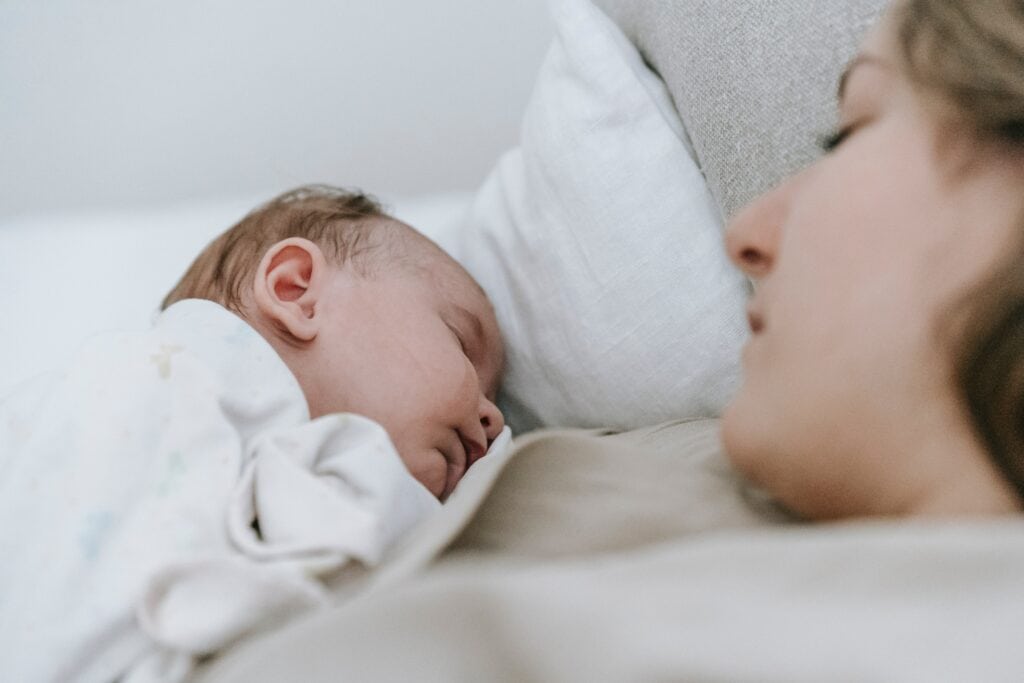
Motherhood Mental Health
I have 10 years of experience working with moms and babies. I can tell you that many moms who co-sleep can experience a shift in their mental health.
There is a good chance that you’re going to feel touched out and you’re going to want to tap out if your baby is depending on you for food and sleep 100% of the time.
I am not saying that contact napping and snuggling your baby are wrong or bad (I love those moments with my babies!). But if I had to do that all the time in order to get my baby to sleep, my mental health would have absolutely suffered.
Remember, mama, embracing motherhood does not have to come at the expense of your health and well-being. Look after your well-being by eating a balanced diet, doing gentle exercise, and resting. If your mental health is suffering, seek help right away, “Postpartum depression requires medical treatment. Speak with your doctor if you have depression that lasts longer than two weeks after giving birth, or if you have thoughts of harming your baby. Postpartum depression can develop at any time after giving birth, even up to a year after delivery,” explains Healthline.
If you are currently pregnant, I recommend investing your time and energy in learning about the infant sleep cycle, the connection between sleep and feeding, and different parenting strategies. If you are currently in that cycle of co-sleeping and you want to find a pathway to set your baby up to work towards independent sleeping, grab the free newborn sleep guide.
You don’t have to choose between co-sleeping and having your baby in a separate room. Room-sharing is a happy medium. This is having your baby sleep in the same room as you but in their own crib. There are certain bassinet designs that have a drop-down side and can be attached to a bed to make co-sleeping safer. The New York Times has a list of the best bassinets.
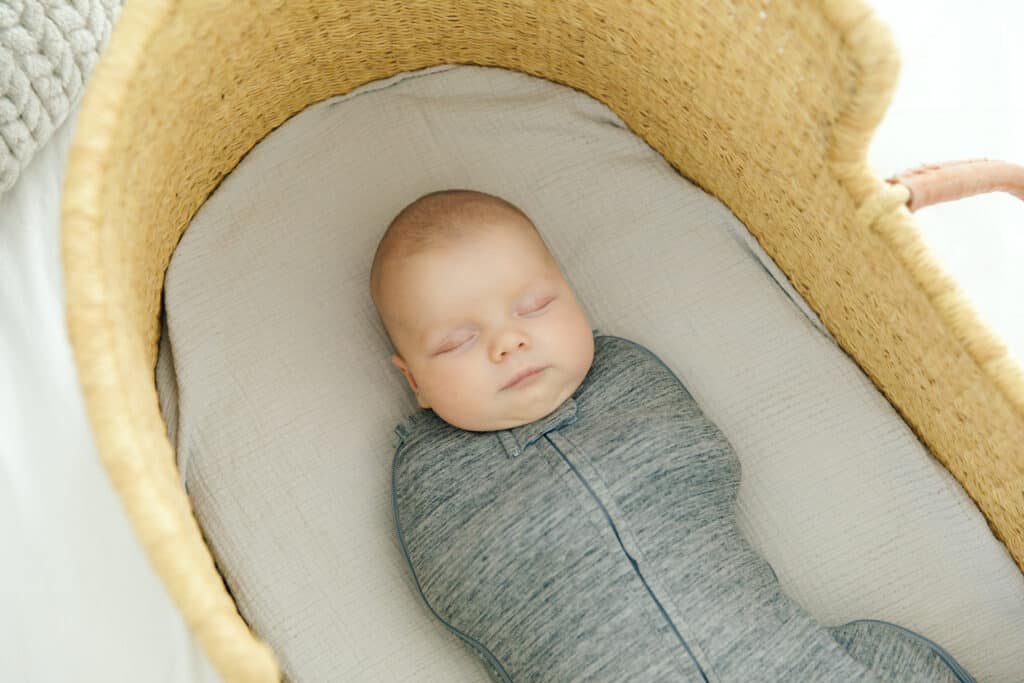
However, a study found that early independent sleepers – babies who slept in their own room before four months – slept longer, and for longer stretches, than babies who slept in the same room as their parents. This, by extension, also impacts the parents’ sleep. Harvard Health points out, “…if room sharing means that parents aren’t getting any sleep because they are woken by every baby whimper and squeak, that’s not good for anybody – and if the parents’ relationship is suffering significantly because they don’t feel that they can or should be intimate near the baby, that’s not good for anybody either.”
Co-sleeping goes beyond just safety – there is so much to consider when it comes to your baby’s sleep habits. Do your research to ensure you’re making the right choice for you, your newborn, and your family.

